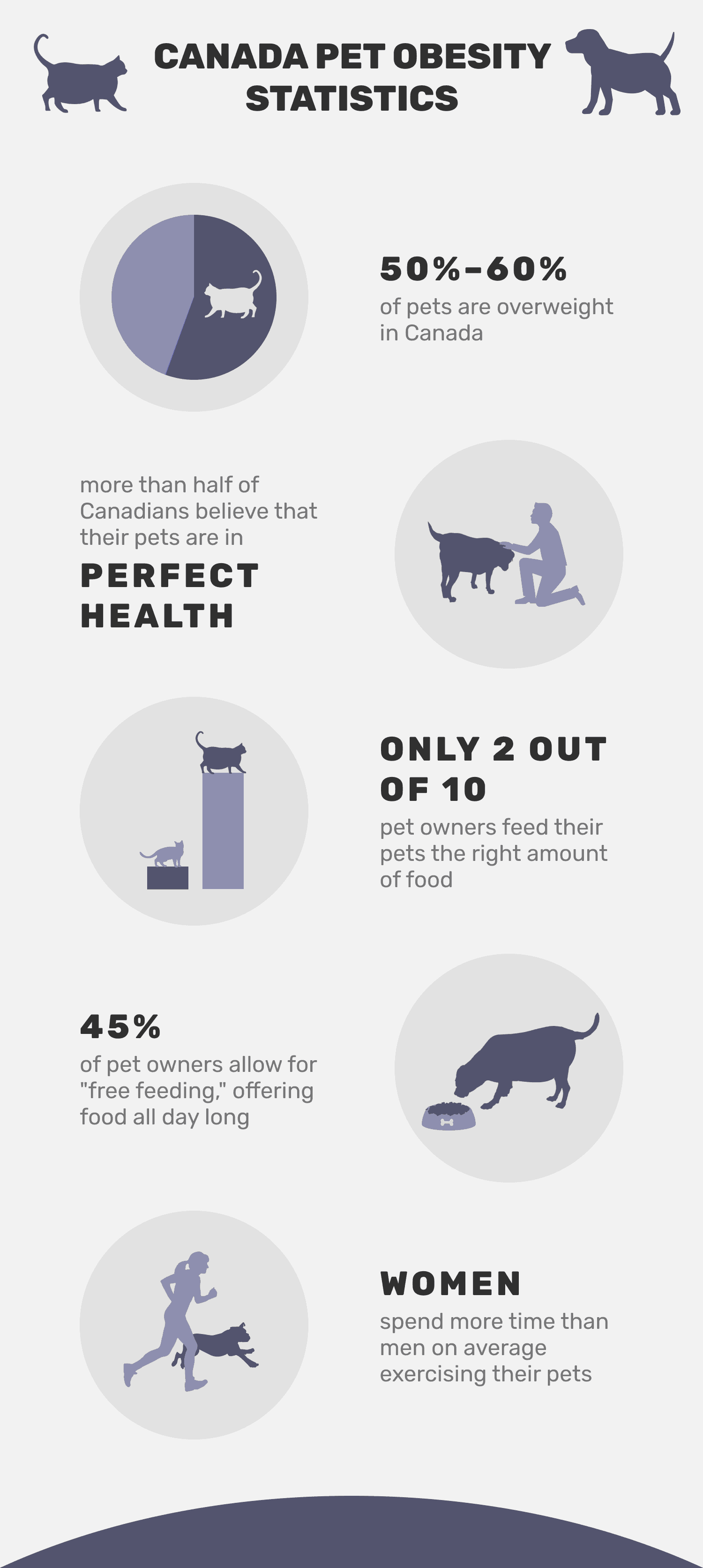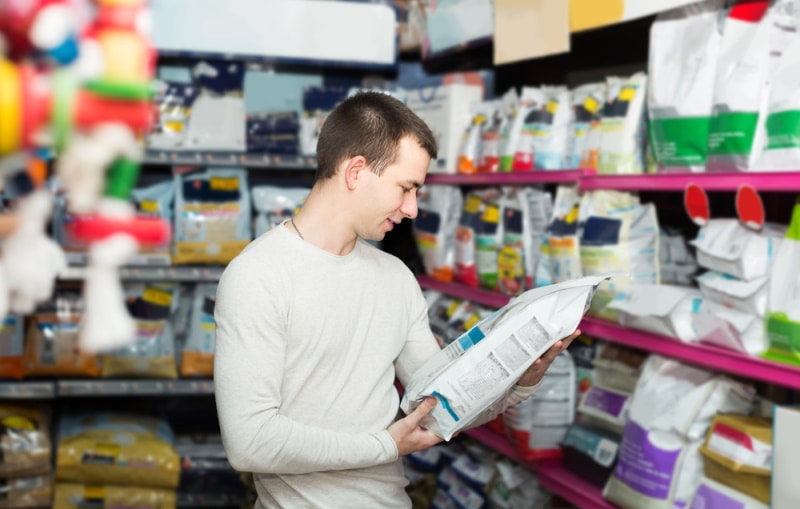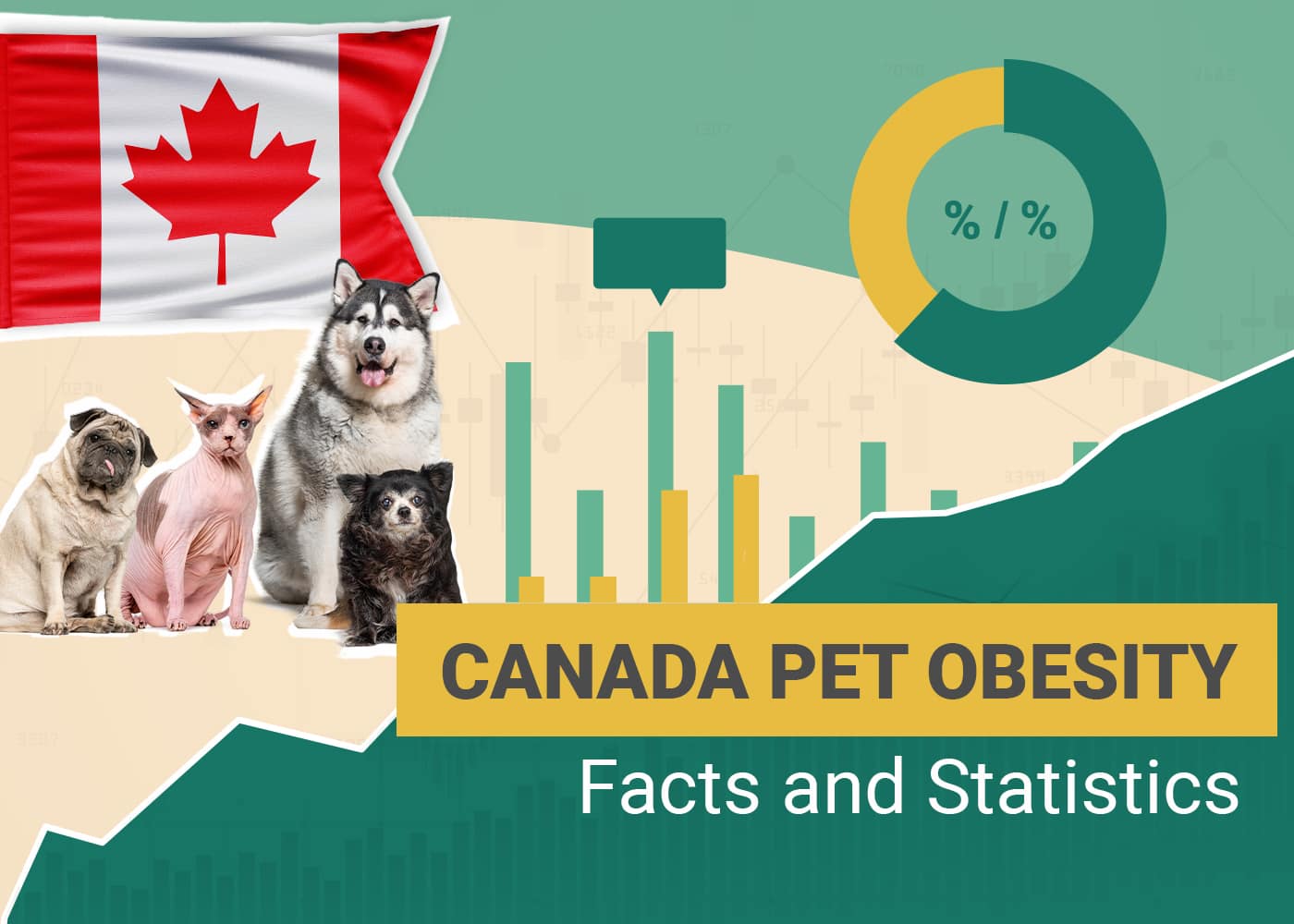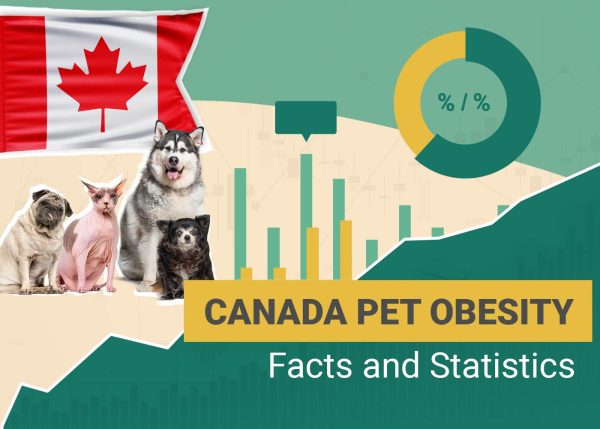Click to Skip Ahead
Note: This article’s statistics come from third-party sources and do not represent the opinions of this website.
Obesity is a serious condition that affects both humans and animals. It’s essentially an excess of body fat that is enough to impact an individual’s welfare, health, and overall quality of life. While it can sometimes be caused by certain diseases, the leading cause of obesity is overeating and not getting enough exercise.
We’ve put together 15 statistics related to pet obesity for Canadian pet owners. We hope this will give you some eye-opening information that will help you to understand the seriousness of having an overweight pet.
In this guide, we’ll give you a range of interesting Canadian pet obesity statistics and facts.
The 15 Canadian Pet Obesity Statistics
- 50% to 60% of pets are overweight in Canada in 2024.
- 94% of pet owners with overweight pets are unprepared to implement a weight-loss program.
- A dog’s lifespan can decrease by 2 years when moderately overweight.
- 32.6% of Canadian cat owners are more likely to implement a weight management plan because obesity negatively affects a cat’s lifespan.
- 41% of Canadian dog owners are more likely to serve premium food to their pets.
- 70% of dog owners fed their dogs table scraps.
- 41% of dog owners gave their dogs more than two treats a day.
- 40% of dog owners feed their dogs an amount based on their own judgment.
- Overfeeding is the most common mistake in a pet’s health.
- 26% of pet owners are willing to spend more on pet food with wellness and health benefits.
- 50% of the treats and pet food purchased are made in Canada.
- 40% of dog owners don’t walk their dogs.
- Owners who spend less than 30 minutes a day exercising their pets are less likely to engage in moderate daily exercise themselves.
- The average walking pace of dog owners is 25 minutes per mile.
- Pet parents spend 1/3 the amount of time exercising their pets as they do watching television.

 Obesity Statistics
Obesity Statistics
1. 50% to 60% of pets are overweight in Canada in 2024.
(University of Guelph)
The Canadian Veterinary Medical Association has stated that the number of pets in Canada that are overweight or obese is on the rise.

2. 94% of pet owners with overweight pets are unprepared to implement a weight-loss program.
(University of Guelph)
When pet owners participated in an online survey, most who owned overweight pets admitted they were unprepared to help them lose weight.
Researchers involved in the survey suggested that pet parents should monitor their pets’ weight, measure daily portions, and learn how to determine their pets’ body condition score at home to help them avoid obesity.
3. A dog’s lifespan can decrease by 2 years when moderately overweight.
(VCA Canada)
Obesity is especially problematic with canines, but a lifelong study on Labrador Retrievers demonstrated how extra weight could reduce a dog’s lifespan. Veterinarians now consider obesity as a chronic, inflammatory condition, and they’re urging pet owners to monitor their pets’ weight closely.
4. 32.6% of Canadian cat owners are more likely to implement a weight management plan because obesity negatively affects a cat’s lifespan.
(University of Guelph)
Obesity is just as hazardous for dogs as it is for cats, and most cat owners said they were more likely to adopt a weight loss program because of obesity’s effect on an animal’s lifespan.
Obesity is a touchy subject, and it’s challenging for veterinarians to discuss weight loss problems with sensitive pet owners.
- You may also be interested in: Best Dog Foods for Weight Loss
 Food and Nutrition Statistics
Food and Nutrition Statistics
(Pet Food Industry)
Premium food typically has higher-quality ingredients, and although it’s expensive, 41% of Canadian pet owners prefer it to discount brands or ultra-premium formulas.

6. 70% of dog owners fed their dogs table scraps.
(Kabo)
Table scraps are among the most significant contributing factors to weight gain in dogs. While giving your dog fruits, veggies, and unseasoned, cooked meat is okay, most table scraps contain spices and additives that aren’t healthy for canines.
7. 41% of dog owners gave their dogs more than two treats a day.
(Kabo)
Like table scraps, too many treats, particularly if given to your dog daily, can lead to weight gain. To prevent weight problems, pet treats should account for less than 10% of their daily caloric intake.
8. 40% of dog owners feed their dogs an amount based on their own judgement.
(Kabo)
The best way to determine how much to feed your pet is to consult your vet or follow the guidelines on the food bag. If you consistently overfeed your dog, weight gain is inevitable.
9. Overfeeding is the most common mistake in a pet’s health.
(Ontario SPCA)
Veterinarians have found that overfeeding is the most common mistake pet owners make with their pets. This is followed by feeding too many treats, always making food available, feeding their pets poor-quality food, and providing them with table scraps.
10. 26% of pet owners are willing to spend more on pet food with wellness and health benefits.
(Business Wire)
The rising cost of pet food has not stopped Canadian pet owners from spending more on their pets to benefit their health and well-being. Around 65% of pet owners reported spending more on pet food than in previous years, which has undoubtedly benefited the pet food industry.
11. 50% of the treats and pet food purchased are made in Canada.
(Pet Food Association of Canada)
Pet food imported to Canada must meet the requirements of the Canadian Food Inspection Agency, and 97% of imported pet food comes from the United States. However, Canada has a thriving pet food industry, and half of the products sold are made in the country.
 Exercise Statistics
Exercise Statistics
12. 40% of dog owners don’t walk their dogs.
(VCA Canada)
Daily walks are vital for a dog’s health, but it’s not surprising, after examining Canada’s obesity statistics for pets, that canines aren’t getting enough exercise. When a dog is a solitary pet, they’re more likely to become overweight than those in multi-dog homes.

13. Owners who spend less than 30 minutes a day exercising their pets are less likely to engage in moderate daily exercise themselves.
(University of Guelph)
Dog owners who walk their dogs over four times a week are more likely to believe their pets are at an ideal body weight. Walking benefits humans and canines, and the healthiest humans apparently have healthier dogs.
14. The average walking pace of dog owners is 25 minutes per mile.
(VCA Canada)
Twenty-five minutes per mile is a slow pace, and it’s a bit too slow if you’re trying to get your dog to lose weight. Veterinarians suggest walking briskly at the beginning of a walk and trying to maintain a 12 to 15-minute per mile pace.
15. Pet parents spend 1/3 the amount of time exercising their pets as they do watching television.
(IBPSA)
North American pet parents spend three times as much time watching television as exercising their cats and dogs. Inactivity contributes to obesity in pets and humans, and playing with dogs and cats more often can improve the owners’ physical fitness.
 Frequently Asked Questions
Frequently Asked Questions
Does Canada have enough veterinarians?
Unfortunately, Canada is experiencing a shortage of veterinary professionals. However, in Ontario, the government is trying to encourage vets to work in less-populated areas with the Veterinary Incentive program. It gives recent graduates up to $50,000 over 5 years if they work in underserved, rural areas. (CBC)
Do Canadian pet owners purchase most of their pet products online?
Pet owners in Canada purchase fewer products online than those in the United States. Only 23% of pet product purchases come from online sources. However, they use online sources frequently to research health and nutrition information. (Business Wire)

Which Barriers Prevent Pet Owners From Accessing Veterinary Services?
A survey conducted in 2022 concluded that the most prevalent barriers that kept pet owners from accessing veterinary services included transportation, the vet clinic’s location, affordability of services, language barriers, and a lack of knowledge. (JSMCAH)
What do Canadian veterinarians think are the most important aspects of being a responsible pet owner?
- Provide preventative and emergency care
- Exercise pets daily and provide mental stimulation
- Provide a nutritious diet
- Spay or neuter pets and get them vaccinated
- Prepare to care for pets for their entire lives
- Select pets that are ideal for your lifestyle and home
- Only care for several pets if they can afford them and care for them properly
(Canadian Veterinary Medical Association)
How do you determine your pet’s quality of life when they’re ill?
Monitoring your pet’s health and maintaining regular veterinary appointments is vital to their well-being.
Here are a few questions to ask yourself if your pet is sick or recovering from injury:
- Are they grooming themselves normally and staying clean?
- Have their eating or drinking habits changed?
- Are they experiencing pain?
- Do they have trouble exercising or moving around?
- Have their bathroom habits changed?
- Has their behavior changed?
After answering the questions, contact your veterinarian to see if you need to schedule a follow-up visit.
(PDSA)
 Conclusion
Conclusion
We do love to give our pets little treats, and sometimes the weather makes it more difficult to go outside, but we should always be vigilant when it comes to our pet’s health. We all want our pets to stay with us for as long as possible and be healthy and happy.
If you’re at all concerned about your pet’s weight, have a conversation with your vet. That way, you’ll ensure that your pet will have a much longer and more comfortable life.
Featured Image Credit: Almi, Pixabay










